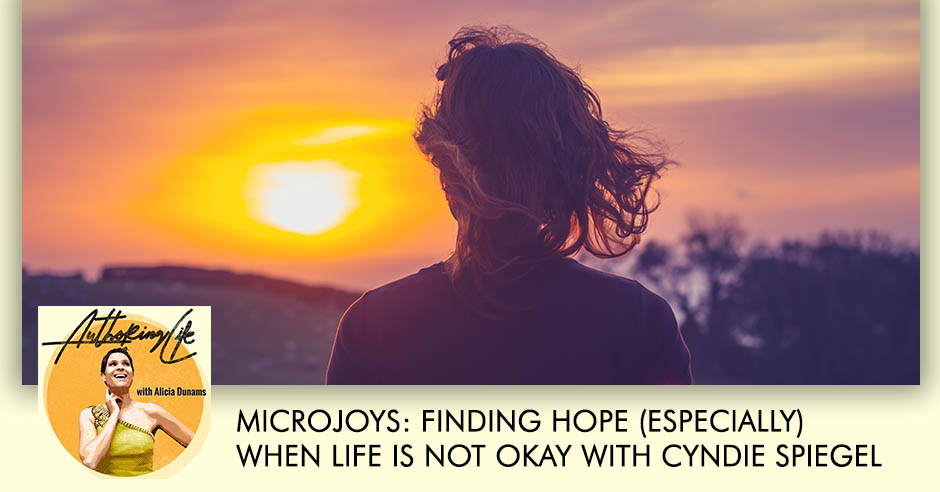
When life decides to crash one tragic and heartbreaking event after another on you, it can be so difficult to find light and hope through it all. Life is not okay, and you can crumble under the weight of it all. However, even with these moments, life must continue. And this episode’s guest has written a book that can help you rise up and have hope again. Cyndie Spiegel, the author and Founder of Dear Grown Ass Women, has a new book that details how she found the bits of beauty or humor or unexpected light amidst the darkness. Microjoys: Finding Hope (Especially) When Life Is Not Okay was born in 2020, an awful year for most and that was especially awful for Cyndie. She lost her mother to cancer. Her nephew was murdered. She was diagnosed with breast cancer. With all the loss and grief, she found it nearly impossible to surface except in small moments that she began to call “microjoys.” Together with Alicia Dunams, she details her incredible and inspirational journey of getting back up and later on writing the book. Join this great conversation and learn from Cyndie how you can hone the ability to access joy despite it all.
—
Listen to the podcast here
Microjoys: Finding Hope (Especially) When Life Is Not Okay With Cyndie Spiegel
In this episode, we’re jumping in very excited with Cyndie Spiegel. We met in New York in 2022 and it’s so wonderful. I was there in the front row for your keynote at the ALT Summit. You were talking about your book Microjoys during the conference and it is out with this show. I’m going to tell you a little bit about Cyndie. Cyndie Spiegel is a born storyteller turned writer. She is a beloved inspirational speaker. I saw it so I can vouch for that.
She’s an author and Founder of Dear Grown Ass Women, an inclusive and highly relatable social community for women over 35. Her book, Microjoys: Finding Hope (Especially) When Life is Not Okay explores how fleeting moments of beauty and joy have helped her weather the worst year of her life and on-going grief. She also wrote the bestselling book, A Year of Positive Thinking: Daily Inspiration, Wisdom and Courage. Cyndie, it is so great to have you here as an aspirational voice and igniter of powerful conversation. It’s wonderful to have you.
Thank you for having me. What an honor. I’m glad to see you again.
I remember I sought you out after and was like, “I need to talk to you.” It’s overwhelming when you do a conference, especially a women’s conference where women start surrounding you in a circle and wanting more of you after you gave an hour keynote. Tell us a little bit about that.
At the end of the day, it’s a blessing to be able to share whatever it is that you’re sharing on a stage and connect with folks afterward. ALT Summit, which was in New York in October 2022, that was the first time I’d spoken in a live audience since pre-pandemic. The second to last talk I gave was in February of 2020 in Palm Springs at ALT Summit.
In particular, the day that I met you, I was so overwhelmed by being around people. In hindsight, I thought it was amazing to be able to connect with everyone. At that moment, I was overwhelmed, a little bit shell-shocked even because it was the first time that I’d also delivered that talk, which was deeply personal. I didn’t think about what the response would be. Shellshocked is the best way I can think to describe that.
Your talk was phenomenal. It moved the crowd and me. That’s why I sought you out afterward and stalk you a bit. It’s so true when you put microjoys on the screen. I want you to define that for our audience but being able to find those little moments that we get to have gratitude for. Before I screw up the definition, I’d like you to give a proper definition so we can speak about it. What are microjoys?
Microjoys are a mindset at the core of them. It’s about honing the ability to access joy despite it all. I often like to say, “It doesn’t mean they’re small. It means that you don’t have to reach very far to access them.” This honing comes down to consciously thinking of the ordinary and being mindful of the ordinary and these moments that we have throughout the day. As I say in the book, “Grief and joy are your dance partners.”
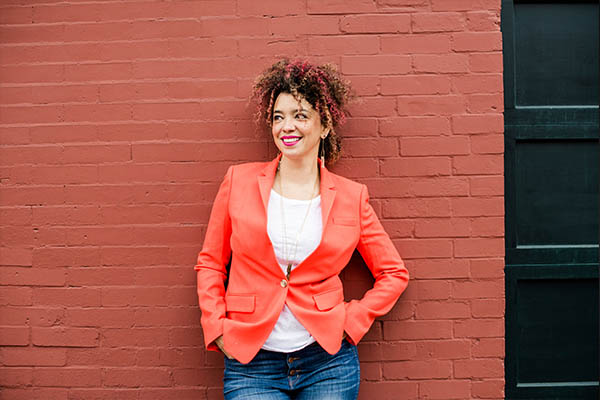
Microjoys allow us to hold the difficult things that are happening in our life and still offer us a respite in moments of joy by accepting and noticing an awareness of the ordinary that’s easy for us to bypass. Microjoys are saying, “Here’s room for all of it. Here’s room for the difficulty, the anger, the sadness, the grieving and also the beauty and the joy.” It’s not one or the other.
In many ways, our culture can be quite toxic around positivity because it demands of us that we always feel good. Microjoys don’t demand that. Microjoys say, “You deserve this moment. You deserve respite but also, it’s okay to sit with whatever it is that you are going through.” That was a long way of telling you what microjoys are. They’re about honing the ability to access joy.
That’s powerful and we can put our arms around joy, pain and everything that happens in that particular moment because that is the definition of life. Can you give me that definition it’s dancing with joy and grief at the same time?
It’s allowing grief and joy to be dance partners. You’re holding them both.
The book gives the definition of microjoys and then it goes into all these beautiful stories and vignettes that have little clues and instructions at the end to support people in being able to look at the ordinary in life and find joy in it. I love the framework of the book. It’s so powerful. This is your second book. Why did you write this book?
The first book that I wrote was called A Year of Positive Thinking. I wrote that in 2018 and it’s 365 quotes, thoughts, ideas and ways of thinking more positively. In 2020, the same week that George Floyd was murdered, my nephew was murdered. He was 32 at the time. I remember after he died, not knowing how to access anything positive.
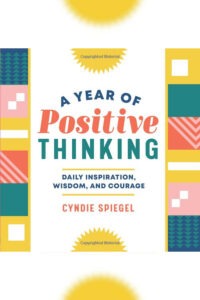
I couldn’t feel optimistic. I am a born optimist. I’ve always been optimistic but when something like that hits you personally, you lost it. I started to feel bad. I wrote a book about this and I couldn’t believe my hype. I couldn’t buy into it at that moment. It wasn’t that I didn’t believe in positive psychology. I did, I do and always will but the idea that a quip or a quote was going to get me through that moment was impossible.
I remember reaching for things that were right there, noticing things that were in front of me. I remember at one point going through a photo album of my nephew when he was a little kid. I was ten when he was born. Seeing all these pictures of him brought me such deep joy. It wasn’t small. It was easily accessible to me because I couldn’t reach or grasp anything. I couldn’t consciously choose joy at that moment.
It’s looking at pictures of him or walking outside on a sunny day and noticing a flower that’s coming through, even though there’s snow on the ground or sitting in the corner of my living room and noticing the way light comes in and hits our wood floors. These were the things that I could hold on to it even during difficult times. None of those things brought him or my mom back but they allowed me a moment of respite from what was also true.
I want to encourage everyone to go purchase Microjoys at your local bookstore. It’s available on Amazon.com as well. You give us a glimpse of what a ten-month period in your life looks like during COVID. Would you be open to sharing a little bit about that so people can get a glimpse?
I talked about my nephew. It was March 2020 when it kicked off the quarantine in the United States. In May 2020, my nephew was killed. My nephew lived with my mom. They were like two peas in a pod. My mom was the one who answered the door for the police at 2:00 AM who said that he was killed. Four months after that, my mom passed away, unexpected. She was sick but we were not expecting her to pass away. I will always believe that she at least partially died of a broken heart.
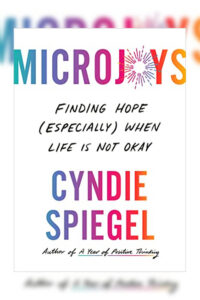
Shortly after my mom passed away, within a month or so, my 49-year-old brother first, had a stroke and went into cardiac arrest. He spent the next two and a half months in ICU. We were in the midst of a pandemic so we couldn’t visit him. We would call my brother who had lost his son and his mom and I would call three times a day up to the ICU for every single shift.
I’m sure they couldn’t wait for my brother to get the hell out of there so we would start calling much but truthfully, it was all we could grasp at that moment. Our family was withering down so quickly and for this to happen to my brother at this moment but by the grace of who knows who, two and a half months later, he made it back home. He is still healing and figuring out his life. Within a month of him coming back home, I was diagnosed with breast cancer.
All of this happened in a ten-month span of time. I share this in my talk and also in the book. At one point, a friend asked me if I thought I was cursed. She’s a very dear friend and it was sheepish the way she asked it. I remember going, “I don’t think so but maybe.” When life keeps coming at you like that, you don’t know what to do. It’s almost like you’re waiting for the other shoe to drop constantly. The last two years have been an undoing of that, reminding myself that’s not always the way that life will be because it felt like that.
It was a rough time and I have to tell you what I’ve since come to know is that there’s a name for it. It’s compound grief when there’s loss on top of loss. As I shared some of that on social media, people started to DM me and explain their situations of this. One person reached out and said, “My entire family died in a car crash.” Stuff like this is mind-blowing. What a privilege to not know compound grief but for many of us, it’s a reality. It has happened and it may happen. Not necessarily exactly like mine or the woman that I described but these things do happen.
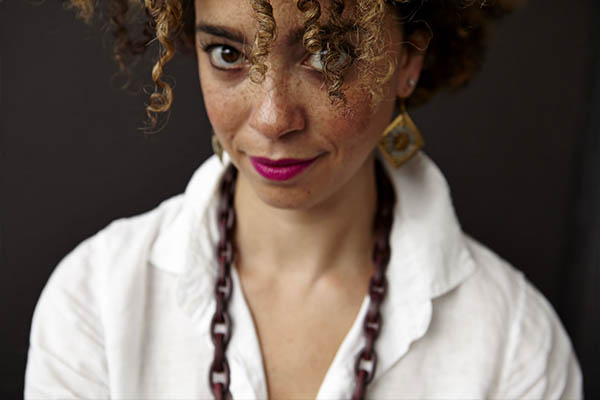
To me, microjoys become about how we hold both of those things. We can’t change the difficult, terrible thing that’s happened but how can we live with it? How can we move forward? How can we move through? The only way we can move through is by allowing ourselves with presence of mind to sit in each moment and accept each moment, oftentimes ordinary moments as they happen because that’s all we have.
The only way we can move through terrible things is by allowing ourselves with presence of mind to sit in and accept each moment, oftentimes ordinary, as they happen because that's all we have. Click To TweetWhen I listened to your talk, I was so moved. People are hurting. These years did a wall up on people in general. It’s still coming and we’re all being challenged. I was sharing with you before we press the record how I had a full circle moment and went through the pandemic with my daughter. We spent it in Palm Springs because I wanted to get the heck out of Los Angeles. I felt something looming in the air and it was before George Floyd was murdered.
I remember it all. It was this tinder box. That compound grief is compound circumstances. I spent beautiful few months with my daughter in Palm Springs and Joshua Tree. We went to two different places. It was so beautiful. In her last year of senior year of high school, I remember she was crying because she didn’t have her high school prom and during graduation, we had to drive up with the diploma. It was like a drive-through.
She was like, “This sucks. Mom, it’s time for me to move to New York.” She got into college there. Even though people don’t have the same circumstances, people can empathize. What you’ve provided people through Microjoys is a toolkit to be able to see the bliss in the ordinary. There’s sun streaming through here. I’m being able to talk to you when we connected in October 2022. I was like, “Do you know this woman who was at the conference? Let me connect her on Instagram,” which I’m going to do.
Going back to your book, Microjoys, I truly feel it is a gift. I’m encouraging everyone reading to buy the book. When you do, go see Cyndie and do her thing in a keynote at a women’s conference. Go to her website. She lives in the New York area and go see her in action. You are such an amazing and powerful speaker. You’re a Dear Grown Ass Women, a website community. Jumping back into the book, you shared a little bit about why you wrote the book. I’d like to hear some lessons that you’ve learned in writing this and some tools perhaps that we can share with the audience at home.
At the core of MicroJoys is the foundation of being present and teaching yourself over and over again to come back to this moment. In its most practical form, one of the things I talk about in the book in terms of acquiring this mindset of Microjoys is allowing yourself to sit quietly more often than you think you need to. I talk about moving from New York City to the suburbs, which are about 20 miles outside of New York City in a town in New Jersey.
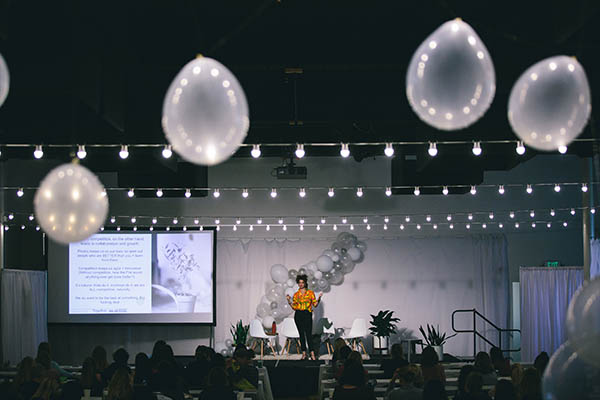
For the first time, I was able to sit in this corner. I sat in this chair and looked around my apartment. I know that sounds incredibly boring and initially, it was but I’ll tell you what happened. When I put my phone and computer down, allowed myself to breathe and sit in the corner, I noticed all of these details. I noticed the squirrels fighting outside. I had no idea they were vicious to each other. I only knew that because I sat down and watched them or the way the light was streaming in or how my cat lays down on the sofa. All of these details are happening day in and day out and we missed them all.
The idea is that even if you could sit for five minutes, put a timer on, move your phone, move your computer, set the timer and sit. Don’t close your eyes. This isn’t about meditating, though I love meditating. I meditate. I am a meditation teacher technically but this is about presence, allowing yourself to sit and be present in the everyday moments because those are the things we forget and they almost become this bank that we can come back to over and over again, particularly when we are struggling.
Another important tool for Microjoys and honing this mindset is documenting everything. When I say documenting everything, it’s the ordinary or the mundane moment. If you look at my phone, I have somewhere between 25,000 and 27,000 pictures. If my phone were to get lost, anyone who will look through these pictures would not think, “What an interesting woman.” They would go, “What was she taking a picture of this for,” like the ceiling in the restaurant I was at with my agent, a flower that I saw outside or my shoes because I thought they looked especially fun.
The reason I document everything is not to share it with the world but to remind myself. That is this archive for me that life and ordinary moments have happened. When I need them, I scroll through the pictures on my phone and it brings me back instantly to that moment because I have captured it. I also journal. I have handwritten notes from my mom. You have to capture and document in ways that feel natural to you. For some people, it’s going to be oral. Tell stories to your friends so that they can reiterate them when you need them. Journal. Take pictures. Do whatever it is that feels right to you. We are building this beautiful library that grounds us when we need it to.
Document everything to remind yourself that life and ordinary moments have happened. Click To TweetThe idea of taking a picture of the ceiling sounds boring but what it did was it brings me to the present moment. I will go back and look at that picture of the ceiling. I will know exactly what it feels like to be in that moment. The only reason I can do that is that I have spent a long time capturing the ordinary. This mindset that I talk about and honing the ability to access joy is about offering this to yourself by these very simple acts that we can do day in and day out. At the end of every chapter and essay, there’s a Consider This section.
I was very specific with that language. Initially, in the editing process, it said, “Try this.” I remember saying to my editor, “I don’t want to tell people how to find their joy or access microjoys.” It said, “I’m not an expert on everybody else’s joy.” Try It sounds like I’m giving you something you should do. We’re considerate. “See if it works for you. Try it if you want to.” The essence of microjoys is I will share with you ways that I found them but ultimately, I hope by reading these essays and stories, you’ll find your way to access them.
Consider this a possibility or a suggestion. It’s a gentle nudge and people will be able to figure it out on their own. That’s what I love about it. You’re such a great storyteller and you paint a picture in these vignettes, even these stories that you share. At the end of each story, there’s Consider This, which gives people a suggestion, a possibility or a gentle nudge on where they can find joy at the moment. That’s beautifully written. I’d love to hear another tool that you feel would be supportive from the book.
Something else that I talk about is legacy and tradition. I remember when my mom first became sick, it was probably about two years before she passed away. It was maybe my 40th or 41st birthday. I don’t know what it was but she was like, “What do you want?” I don’t know if your mom gives good gifts. My mom did not give gifts. She knew this and at some point, as an adult, you buy the stuff that you want.
Every year, we would do this game of, “What do you want for your birthday?” I would say, “Nothing.” I would get these very odd gifts. I finally said to her, “Mom, I don’t want anything for my birthday except this. I would love it if you would handwrite our family’s recipes.” I am a Biracial Black Jew and I grew up in a house where the food was some mashup of Jewish food and soul food.
I didn’t realize that this wasn’t what everybody ate or that Jews or Black folks ate because that’s how I grew up. We had so many recipes that even though my mom had them in her brain and she may have had them typed up somewhere, my mom’s handwriting is ingrained in my memory that I wanted to have those recipes in her handwriting.
She did. She bought some cheesy book that’s like to my daughter with pastels and flowers. She spent that year compiling recipes. You can see her writing beginning to shift because her hands became shakier. Even in writing those recipes, I pull that book out for every holiday, whether it’s Hanukkah, Chrismukkah as we call it or Thanksgiving. My mom has notes like, “Don’t walk away from the stove because if you do, the bottom will burn.” She’s mothering me even in her handwriting.
I don’t know how I had the foresight or the wisdom to know that one day that would be powerful for me. Having those family recipes and her handwriting is invaluable to me. In capturing Microjoys and building this, I say, “Think about legacy and tradition.” What are the legacies and traditions that we have in our lives that we take for granted? We assume we will always have. Our people are not always going to be there. It’s not a matter of what or if. It’s a matter of when. Even acknowledging that out loud and saying, “If this person weren’t here, what would be important to me?”
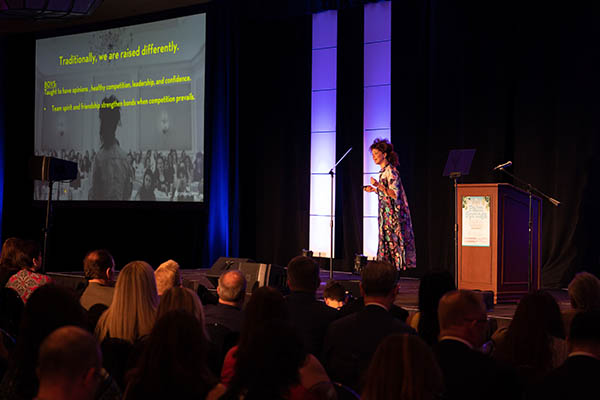
Capture that in a way that you can. We’re getting older and the people around us are getting older. What do we want to have when they are not here? It’s never the physical stuff. It’s very rarely the fancy things. It’s the little things. For me, it’s my mom’s voicemails that I still listen to. It is knowing that I can look at this recipe book and it’s going to have her writing in it. It’s looking at cookbooks that are so old that the spines are all cracked. There’s coconut on a page or whipped cream. It’s disgusting but I feel at home when I see it.
With my FaceTime with my dad, mom and daughter, I’ll take pictures. That’s something I do, screenshots. I want to capture that moment. There was one time at my brother’s wedding in Boston in 2019. My parents loved to eat. I call it mixed race. My dad is from New Orleans. My mom is from England. There was such a mix in terms of not only race but culture and wealth.
My dad was very poor. My mom came from a wealthy family. There were chasms in the relationship that I always felt I was a mediator and peace-making all the time, which is still something my therapist brought up to me. It’s something I get to reconcile and look at. My dad was enjoying this pancake. I took a video of him chewing. I put on a little filter and it had some romantic music. The hearts are fluttering around his mouth and he was looking at me. He didn’t even know I was taking a video.
I watched Quincy Jones’ documentary and Rashida Jones did the documentary about her father. Talking about legacy, what a beautiful capture. I’ve recorded my dad’s interviews. My mom and I keep voicemails as well. I have both of my parents. Thank you for sharing that. Your book as you’re reading it, you see the urgency and how things quickly can turn. Some of my friends lost their parents. All of a sudden, things are happening and gone. You must share that with people, be present and see the joy in the little things, in the crust and the cookbook.
I don’t want to move too quickly past this video of your dad because that is the core of microjoys. These ridiculous things that we could so easily take for granted or roll our eyes over. One day, you are going to want to look at this. If anyone can see you, the smile on your face is telling that story. Your whole face is lit up. That’s why we document these moments. Your dad was living his best eating pancakes and bacon.
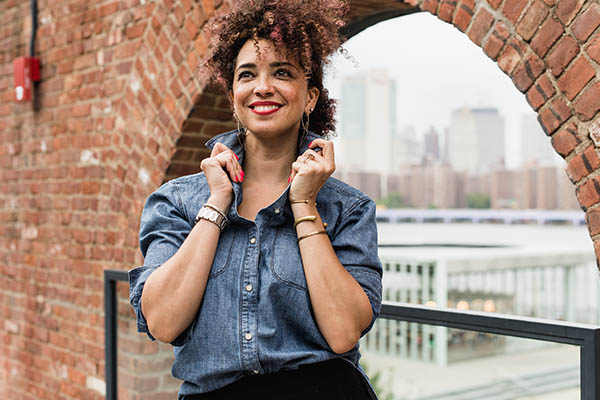
He looked the phone up and was looking at me like, “What is she doing?”
You have that forever. Isn’t that in these weird hearts circling? That is the most ordinary and mundane magic and those are the things we want to capture. We talk about building this mindset of microjoys. What it took for you to do that was to be still and present enough at that moment to see your dad ridiculously eating this pancake and enjoying it. It’s easy to be doing all these different things, having all these conversations with other people and not even noticing that.
I wanted to share another story with you. I told you how I had empty nest syndrome big time. I spent the last part of my daughter’s senior year in Palm Springs during COVID doing beautiful things like cooking and Easter egg hunting. We had this big backyard in Joshua Tree and there were all these feral rabbits on Easter.
I was thinking about having this beautiful time and she went to college in New York. I went to go live with my parents. I didn’t have a home. I felt very ungrounded. I remember walking into a Kohl’s and there was the baby girl section. I got to my car crying. I would go home and be like, “How did I end up back here?” A beautiful moment is my parents have maintained my high school bedroom. It was in the ‘80s with a big round mirror.
They’re cream lacquer and silver. Every major milestone of my life was when I graduated from high school, graduated from UCLA, traveled around the world for a year by myself and felt like I disappeared. This was before cell phones. Hotmail was becoming a thing. This was many years ago when I traveled around the world. I looked in that round mirror and it’s a full circle moment. What I noticed was I had a picture of me from high school and a picture of me from college graduation.
I would start crying like, “What happened? I was gone for a year.” When my daughter left to go to New York and I was living in my parent’s house for a couple of weeks, I started looking in the mirror and I noticed there was a picture of her added. I was like, “That picture wasn’t here last time. I had this reflection in this mirror. Where did the eighteen years go?” Every time I look in this mirror, it almost like a ton of time capsule. It’s this thing I return to that I go out and live my life. My parents’ house doesn’t change. It gets more cluttered for days and decades. I go live life and come back. I look at this mirror and it makes me cry thinking about it. I went places.
I followed her to New York like a little puppy. I saw that she had her life with her friends. I wasn’t a part of it anymore and that’s okay. I’m moving down to Miami and having my life here. That story is so moving. Even though I wouldn’t probably have it in my house, that mirror is a grounding force. One day, I’m going to look in that mirror and it’s going to be for another reason and milestone.
That mirror is very much a grounding force for me because it’s been in my life for a lot of years. It’s insane. This is what you open up for people with your book and keynote. That’s why I encourage people to not only buy the book but read the book, listen to the audiobook and come to your in-person events, training and keynotes.
Thank you for saying that. I have to respond two things. One, that archive will exist, God willing, forever. You said you’ll keep coming back to it. That’s what we want to remember. That’s the legacy. That’s the stuff we want to keep coming. It’ll have you in your feelings for sure. I look at my mom’s cookbooks and I see the scrapes of food that are on them. It gets me in my feelings and the way that your mirror does.
That is the fullness of life. It’s recognizing yourself and all of these moments throughout your life. There’s so much that comes with that. First, I want to acknowledge that archive, which is what that mirror is. Second, I want to honor how fancy you were in the ‘80s with a beige lacquer like a cream color. It’s so fancy. I didn’t want that to slip on. Did you say that it had gold in it too?
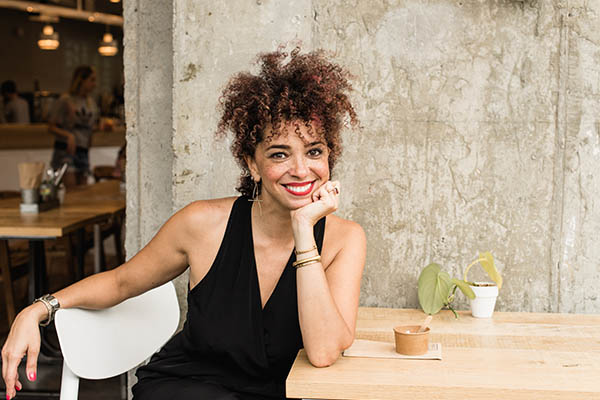
It’s in style now.That’s great with interior designer fashion. I know people who are stylish. I know it’s in style.
I didn’t want to forget that. Only very fancy people had that in the ‘80s and it’s you.
I’m glad I was able to share that with someone. I ended up sharing it with my partner, my loving companion that I’ve been with for years. I remember sharing it on a park bench or the day before I was flying to New York. He was living in Europe at the time. I told him that story and I was bawling. It represents a lot.
You said something in the book and it made me think, especially since my therapist talked about it. You talked about the generational trauma of holding space, especially being a mixed-race woman. This is something I’ve been reflecting on as well. I’m writing a book around conflict resolution, mediation, racial healing and things of that nature, being a physical embodiment of conflict of different cultures. My body holds space for my dad coming from New Orleans, a poor family with ten children.
My mom comes from England wealthy. This DNA has come together with me holding space and even being in the middle of their arguments and defending each side. I was like, “How can I live with both powers in me,” especially in America where we swim in it. These conversations aren’t in-depth like in other countries. We swim in it here and to have that inside you, it’s like you’re holding space for something that naturally conflicts and being evolved enough to say, “How can we bring this together, who I am and who I be in this world?”
Identity is such a big part of everything that we do. I touch on it in the introduction a little bit of this idea of generational trauma. I have holocaust as part of my heritage and Black folks and slavery, African-Americans in particular as part of my heritage. I have to often remind myself that aside from trauma running through my bloodline, there’s joy and resilience.
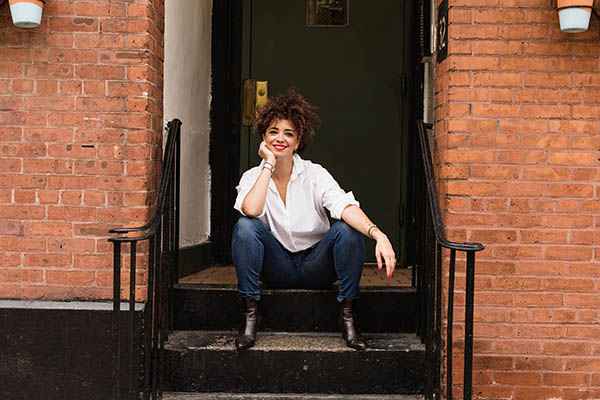
Go to a Jewish wedding or a Black church, tell me you’ve ever seen anything as fabulous in your life. If you have never been to a Black funeral and you go to a Black funeral, you walk away feeling so good. Oftentimes it’s because it’s treated as a celebration of life. There’s dancing and music. The reason that’s important for me to remind myself of often is that joy is my birthright, as well as triumph. It’s like holding grief in one hand and joy in the other.
It is quite different if you are biracial, not just in the way that we are but anyone. It feels like we’re holding two opposite truths. They’re not the opposite of us. They’re who we are but it can feel as though they’re in opposition to one another. I felt that especially deeply in 2020 in a way that I never had before. When Black Lives Matter landed on the global stage, I remember in the midst of all of this personal loss, feeling a collective loss and confusion about who I was. Not confusion as I don’t know who I am but where do I stand in all of this?
It’s holding space for a lot of different realities and truths. That could be an exhausting place to be. I truly think as humans that our conflicts and healing those conflicts are the doorway or portal to our next evolution of growth.
Finding a different level of joy, acceptance and community. It all comes from within.

We’ll shift gears into a little lightning round. This is the first thing that comes to mind. Cyndie, what is your legacy?
My legacy is for the folks around me to consider that they have a choice in the life that they live. For folks to always know that no matter where you come from, you decide where you’re going.
Favorite book?
When Things Fall Apart by PEMA Chodron
Favorite author?
Maya Angelou.
What are you reading next? What’s on your bookshelf?
There are ten books on the side of my bed. I’m pulling this up. I know this doesn’t work for a lightning round but bear with me, it’s here and I need to tell you because I want to tell you the truth but I have so many going at the same time. Spare by Prince Harry, Hello, Obama, The Light We Carry, Someone Else’s Shoes by Jojo Moyes and Living in the Light by Deepak Chopra.
Do you read those concurrently or are they audiobooks?
They’re audiobooks and I listen to them concurrently. I’ll tell you why. My brain doesn’t work to focus on just one thing for any length of time. I can listen to Prince Harry and this non-fiction about living in someone else’s shoes. My brain needs to be in a few different places. I’ll listen to one and then while I’m taking a shower, I listen to another. I am always listening to multiple books at a time and I have a book stack on the side of my bed, 10 books or maybe 11.
What Enneagram are you?
I don’t remember. That’s terrible. What a failure.
I was thinking seven.
It’s 7 or 8. It’s on my Instagram. I don’t remember.
I’m 7 with a wing of 8.
We’re going to have to discuss this further after.
The last question is, what are you writing next?
The Companion to Microjoys.
Cyndie, where can people find out more about you and your next talks and events?
They can find that on my website but mostly that’s not updated as much as Instagram, which I hate to admit because I don’t own Instagram but I am on Instagram more than anywhere else.
How can we find you in Instagram?
@CyndieSpiegel on Instagram or at @DearGrownAssWomen, which is very different content.
Cyndie, thank you so much for being here. I’d love for you to leave with our audience maybe one last piece of wisdom.
Do more, nothing. Truly, life passes us by so quickly. You will never regret spending 5 minutes of alone time or 10 additional minutes with your loved ones.
Life passes us by so quickly. You will never regret spending 5 minutes of alone time or 10 additional minutes with your loved ones. Click To TweetCyndie, it was so great to have you here. This has been a complete joy. It’s very exciting and wonderful to reconnect with you. I’m looking forward to continue next time I’m in New York, creating magic together.
If I’m in Miami, you might see me sooner. You’ll never know.
Maybe Palm Springs or Los Angeles. We’re going to figure it out.
All of those places. Thank you for having me.
Important Links
- Microjoys
- Dear Grown Ass Women
- A Year of Positive Thinking: Daily Inspiration, Wisdom and Courage.
- Amazon.com
- When Things Fall Apart
- Spare
- Hello, Obama
- The Light We Carry
- Someone Else’s Shoes
- Living in the Light
- @CyndieSpiegel – Instagram
- @DearGrownAssWomen – Instagram
About Cyndie Spiegel
 Cyndie Spiegel is a born storyteller-turned-writer. She is a beloved inspirational speaker, author and the founder of Dear Grown Ass Women®, an inclusive and highly relatable social community for women 35+. Her new book, Microjoys: Finding Hope (Especially) When Life is Not Okay (out February 28, 2023) explores how fleeting moments of beauty and joy have helped her weather the worst year of her life and ongoing grief. She also wrote the best-selling book, A Year of Positive Thinking: Daily Inspiration, Wisdom & Courage. Cyndie is an aspirational voice and an igniter of powerful conversation. Before imploding her life (the first time) at the age of 35, she spent 15 years in the New York fashion industry. She is a former adjunct professor at Parsons School of Design, and Fashion Institute of Technology; and holds a masters of professional studies. She is NYCAPP certified in Applied Positive Psychology and is also a trained yoga and meditation teacher. Her honest storytelling, vulnerable self-inquiry, and penchant for swear words have made her a sought-after speaker and facilitator for conferences, brands, and organizations, and she has been featured in publications such as Entrepreneur, Forbes, Glamour, Teen Vogue, and The Huffington Post. She currently lives in New Jersey with her (very handsome) photographer husband, two cats, way too many patterns, and an excessive number of houseplants.
Cyndie Spiegel is a born storyteller-turned-writer. She is a beloved inspirational speaker, author and the founder of Dear Grown Ass Women®, an inclusive and highly relatable social community for women 35+. Her new book, Microjoys: Finding Hope (Especially) When Life is Not Okay (out February 28, 2023) explores how fleeting moments of beauty and joy have helped her weather the worst year of her life and ongoing grief. She also wrote the best-selling book, A Year of Positive Thinking: Daily Inspiration, Wisdom & Courage. Cyndie is an aspirational voice and an igniter of powerful conversation. Before imploding her life (the first time) at the age of 35, she spent 15 years in the New York fashion industry. She is a former adjunct professor at Parsons School of Design, and Fashion Institute of Technology; and holds a masters of professional studies. She is NYCAPP certified in Applied Positive Psychology and is also a trained yoga and meditation teacher. Her honest storytelling, vulnerable self-inquiry, and penchant for swear words have made her a sought-after speaker and facilitator for conferences, brands, and organizations, and she has been featured in publications such as Entrepreneur, Forbes, Glamour, Teen Vogue, and The Huffington Post. She currently lives in New Jersey with her (very handsome) photographer husband, two cats, way too many patterns, and an excessive number of houseplants.
Love the show? Subscribe, rate, review, and share! http://aliciadunams.com/
